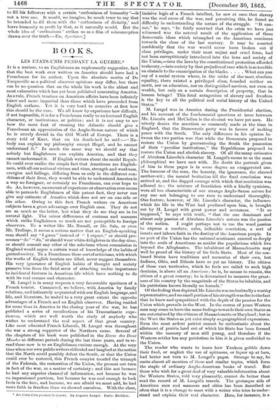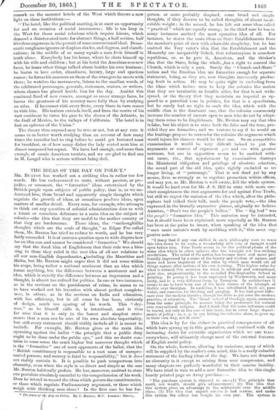BOOKS.
LES ETATS-UNIS PENDANT LA GUERRE.•
Ir is a curious, to an Englishman an unpleasantly suggestive, fact that the best work ever written on America should have had a Frenchman for its author. Upon the absolute merits of De Tocqueville as a political observer opinions may differ, but there can be no question that on the whole his work is the ablest and most exhaustive which has yet been published concerning America. As a rule, French treatises on American affairs have been infinitely fairer and more impartial than those which have proceeded from English authors. Yet it is very hard to conceive at first how this should be the case. We all know by experience how difficult, if not impossible, it is for a Frenchman really to understand English character, or institutions, or politics ; and it is not easy to see how the mere fact of crossing the Atlantic should give a Frenchman an appreciation of the Anglo-Saxon nature of which be is utterly devoid in the Old World of Europe. There is a story told of Kaut, that on his death-bed he said :—" No- body can explain my philosophy except Hegel, and he cannot understand it." In much the same way we should say that nobody but Englishmen can explain America, and that they cannot understand it. If English writers about the model Repub- lic could ever realize the simple fact that Americans are English- men, with all our national virtues and vices, strength and weakness, energies and failings, differing from us only in the different con- ditions of their lives, they would be able to understand America in a way no foreigner, or certainly no Frenchman, can ever hope to do. As, however, no amount of experience or observation ever seems able to persuade Englishmen of this patent fact, they never can give any estimate of America which does not err on one side or the other. Owing to this fact French writers on American subjects have a great advantage over English ones. They do not see as much as the latter, but what they do see they see in its natural light. The minor differences of customs and manners which strike Englishmen so much are not perceptible to foreign observers. To a writer like Mr. Russell, or Mr. Sala, or even Mr. Trollope, it seems a serious matter that an English-speaking man should say "I guess" instead of " I expect," or should pro- nounce " do " " du," or should wear white-kid gloves in the day-time, or should commit any other of the solecisms whose commission in England would argue a certain want of knowledge of the habits of genteel society. To a Frenchman these sortof criticisms, with which the works of English tourists are filled, never suggest themselves. His very ignorance of English habits of thought and society preserve him from the fatal error of attaching undue importance to incidental features in American life which have nothing to do with its real essence and character.
°M. Laugel is in many respects a very favourable specimen of a French tourist. Connected, we believe, with America by family relations, and intimately acquainted with our English language, and life, and literature, he united to a very great extent the opposite advantages of a French and an English observer. Having resided for some time in America in the closing year of the war, he has published a series of recollections of his Transatlantic expe- riences, which are well worth the study of anybody who wishes to understand the real aspect of that great country. Like most educated French Liberals, M. Laugel was throughout the war a strong supporter of the Northern cause. Several of the chapters of his book were published in the Revue des Deux Afondes at different periods during the last three years, and to re- read these now is to an Englishman curious enough. At the very time when our own public writers ridiculed and laughed at the notion that the North could possibly defeat the South, or that the Union could ever be restored, this French essayist treafbd the triumph of the Federals, the restoration of the Union, the present out-turn in fact of the war, as a matter of certainty ; and this not because he had any superior channel of information, not because he was an impassioned partizan, but because he was cool enough to look facts in the face, and because, we are afraid we must add, he had more faith in freedom than we showed ourselves. With the clear,
* Lea Etats-Unit pendant Is Guerre. By Auguste Laugel. Paris: BAilltbre.
incisive logic of a French intellect, he saw at once that slavery was the real cause of the war, and perceiving this, he found no difficulty in understanding the nature of the struggle. "It can- not," he says, "be fairly asserted that the crisis we have just witnessed was the natural result of the application of those democratic ideas which triumphed on the American continent towards the close of the last century. It may be asserted confidently that the war would never have broken out if class privileges, under their most unjust and cruel form, had not been surreptitiously introduced into the laws and society of the Union,—into the laws by the constitutional protection afforded to slavery,—into society by that prejudice of race which is so terrible an obstacle to the emancipation of the blacks What can you say of a social system where, in the midst of the most absolute equality, there existed a privileged class, founded neither on merit, nor on education, nor on distinguished services, nor even on wealth, but only on a certain description of property, that in human beings? This fatal antagonism of slavery and freedom is the key to all the political and social history of the United States."
M. Laugel was in America during the Presidential election, and his account of the fundamental questions at issue between Mr. Lincoln and McClellan is the clearest we have yet seen. He utterly denies the assertion so commonly made at the time in England, that the Democratic party was in favour of making peace with the South. The only difference in his opinion be- tween the two parties was that while the Democrats proposed to restore the Union by guaranteeing the South the possession of their "peculiar institutions," the Republicans proposed to restore the Union and abolish slavery. Of all the many estimates of Abraham Lincoln's character M. Laugel's seems to us the most philosophical we have met with. No doubt the portrait given of him in these pages is in some degree an exaggerated one. The humour of the man, the honesty, the ignorance, the shrewd mother-wit ; the mental hesitation till the final conclusion was arrived at, and the dogged courage with which that resolution was adhered to ; the mixture of fanaticism with a kindly cynicism, were all too characteristic of our strange Anglo-Saxon nature for any one not belonging to our race to understand thoroughly. One feature, however, of Mr. Lincoln's character, the influence which his life in the West had produced upon him, is brought out by M. Laugel with great power and acuteness. "It so happened," he says with truth, " that the one dominant and almost only passion of Abraham Lincoln's nature was the passion of the nation. I ought perhaps not to use the word passion to express a resolute, calm, inflexible conviction, a sort of innate and inborn faith in the destiny of the American people. In no part of the Union has the national sentiment entered so deeply into the souls of Americans as amidst the populations which live beyond the Alleghanies. The inhabitant of Massachusetts may well be proud of the history of his little State. Most of the sea- board States have traditions and memories of their own, but Indiana, Ohio, and Illinois have as yet no history. The citizen of these vast territories, which he feels are called to such high destinies, is above all an American ; he is, he means to remain, the citizen of a great country; he is determined to measure the great- ness of his country by the magnitude of the States he inhabits, and his patriotism knows literally no bounds."
Of the feeling thus depicted Mr. Lincoln was undoubtedly a worthy representative, and no small portion of his strength was due to the fact that be knew and sympathized with the depth of the passion for the Union which prevails in the West. In the course of years Western men may come to have the same feelings towards their own States as are entertained by the citizens of Massachusetts or Maryland ; but in the West the States as yet exist simply as geographical expressions. Even the most ardent patriot cannot be enthusiastic about the allotment of prairie land out of which his State has been formed within the memory of men still young, and therefore if the Western settler has any patriotism in him it is given undivided to the Union.
The reader who wants to learn how Yankees gobble down their food, or neglect the use of spittoons, or liquor up at bars, had better not turn to M. Laugel's pages. Strange to say, he omits almost all mention of these and similar topics, which form the staple of ordinary Anglo-American books of travel. But- those who wish for a great deal of very valuable information about the Western States, told very pleasantly, cannot do better than read the record of M. Laugel's travels. The grotesque side of American men and manners and cities has been described so often that it is a change to meet with a writer who tries to under- stand and explain their real character. Here, for instance, is a remark on the monster hotels of the West which throws a new light on these institutions :- " The hotel, like the political meeting, is at once an opportunity for and an occasion of social intercourse ; life is too busy in the West for those social relations which require leisure, which demand a disinterested taste for abstract things, a half serious, half frivolous eagerness in the pursuit of some conventional ideal. Demo- cratic roughness ignores or despises shades, and degrees, and classifi- cations; in the middle of so many equals a man feels himself in truth alone. Everybody has his home, where he shuts himself up with his wife and children ; but at his hotel the American sees new faces, he hears other things talked about besides his own business ; he learns to love order, cleanliness, luxury, large and spacious rooms ; he forms his manners on those of the strangers he meets with there; he watches the movements, listens to the smallest words, of the celebrated personages, generals, statesmen, orators, or writers, whom chance has placed beside him for the day. Amidst this continual flood of new comers, amongst so many strange faces, he learns the greatness of his country more fully than by studying an atlas. If he cannot visit every State, every State in turn comes to. visit him. His horizon extends itself, and from the centre of his vast continent he turns his gaze to the shores of the Atlantic, to the Gulf of Mexico, to the valleys of California. The hotel is in fact an epitome of the Union."
The theory thus exposed may be true or not, but at any rate it seems to us better worth studying than an account of how many times the traveller had to ring before he could get buttered toast for breakfast, or of how many dishes the lady seated next him at dinner composed her repast. We have had enough, and more than enough, of comic American tourists, and we are glad to find one in M. Laugel who is serious without being dull.































 Previous page
Previous page